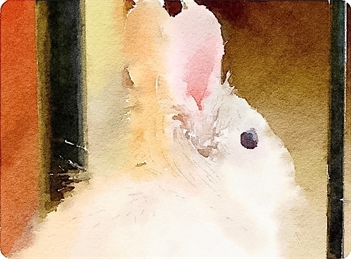House Rabbit Community and Store
What are we about? Please read about our Forum Culture and check out the Rules.
The subject of intentional breeding or meat rabbits is prohibited. The answers provided on this board are for general guideline purposes only. The information is not intended to diagnose or treat your pet. It is your responsibility to assess the information being given and seek professional advice/second opinion from your veterinarian and/or qualified behaviorist.
› FORUM › THE LOUNGE › Great article about proposing a law for pet welfare
- This topic has 3sd replies, 4 voices, and was last updated 8 years, 11 months ago by
 Q8bunny.
Q8bunny.
-
AuthorMessages
-
-
02/06/2017 at 3:33 PM
I just saw this article on a Dutch news website: http://www.nu.nl/wonen-en-interieur/4437501/aankoop-huisdier-zou-met-handleiding-moeten-komen.html
General gist of the article: many people can buy pets without having the proper information on how to care for that type of animal. This leads to many problems and animal suffering. Pet sellers are not required by law to educate the buyers and provide that information, the government leaves that up to the pet industry itself. Unwise, say Dutch animal welfare activists, sellers should be required to inform people about proper pet care before the sale.
I really hope that this will one day become a law, because rabbits are often mistreated here in NL. I’ve highlighted the bunny news in bold.
Here’s the translation that I made:
Buying of a pet should be accompanied by a handbook/guidelineFrom July 2017 153 species of mammals have been put on a blacklist in the Netherlands, this list contains animals which shouldn’t be kept as pets. But such a list isn’t enough to prevent animal suffering, say Stichting AAP (monkey rescue) and the Dierenbescherming (Dutch RSPCA). “I’m happy that the list is here, that took long enough”, says David van Gennep, CEO of Stichting AAP. “But the way the list is implemented saddens me. It’s been discussed since 1992 and a lot of time, money and effort has been put into it. And now the government says: let’s leave the regulations for pet care to the pet industry.”
The government released the list at the end of January, with 153 species of mammals on it which cannot be kept as pets after July 2017. Owners can keep their pets until the pass away, but they’ll have to be registered and they cannot be used for breeding. Another list has been made with 123 species of mammals which are allowed. Other lists will be made regarding birds, fish and reptiles.
Potential danger
The Dierenbescherming has been consulted by the ministry about the process of making the list, which was created by independent specialists. “Potential danger is assesed for each species: the potential danger to humans and/or other animals, and it’s assesed whether an animal is fit to live in captivity”, says Niels Dorland of the Dierenbescherming.
“So many animals are being bought by consumers without asking themselves: do I know enough? Think about a turtle for instance, which is sometimes put in a cheap plastic tub which is way too cold for it. It isn’t just a few isolated cases, but a large number of consumers. Often they mean well, and they want to get a special pet, but it should be accompanied by a handbook/guideline.”
The skunk, the prairie dog and the porcupine are examples of animals who are now on the black list, but are found as pets more than you would expect. The numbers are unknown. “That’s not registered”, says Van Gennep. “We only see the numbers in the shelters and that’s just the tip of the iceberg. Then it’s already too late.”
Health issues
Van Gennep sees some animals on the “white” list which he thinks shouldn’t belong there. These are still being researched. It’s especially dangerous that the pet sellers are not required to give the buyer of a pet a handbook or guideline for the proper care of the animal. This has dire consequences. “For instance: the caretaker doesn’t recognise health issues. An animal which is not suitable as a pet will only lead to trouble.”
Problems with taking proper care of an animal are seen in kangaroos and deer, but also in regular pets such as rabbits. Researchers of the Veterinarian Institute of the University of Utrecht will do research on the happyness of pet rabbits. Many of them are being kept in extremely small cages and many are alone too often.
Dorland thinks that more and more of these studies will be performed in the future. “Switzerland for instance has a law which states that some animals should only be kept in pairs, like parakeets. We haven’t reached that level yet in NL, but we’re headed there. Twenty years ago we couldn’t imagine this, but we may have these laws within 20 years, if not sooner. Dogs are on the white list, but people are bitten by certain agressive dog types regularly. That raises questions about whether it’s wise to keep those animals.”
Regulations
The government wants the pet selling sector to provide the buyer with information to prevent these situations. But as long as it’s not required by law, it will not happen all the time, says van Gennep.
“We are happy that many animals have been registered as “unsuitable as pet”. But for the animals on the white list hardly anything changes. The sector isn’t fit to self-regulate, because there are so many pet sellers, both in stores and online. Many animals are traded through online stores and this trend is only increasing. It’s old-fashioned thinking from the government to think that the sector will provide the buyers with the proper information.”Stichting AAP says that a helpdesk can assist pet owners with questions about proper animal care. Such a helpdesk could also spot problems. Stichting AAP would like to take this task upon themselves, and they have informed secretary of state Martijn van Dam. “I haven’t had a reaction yet, but I think that there will be such a helpdesk in the future. The government agrees that a white list is a good phenomenon, but that solves just one part of the problem. The rest of it will have to be adressed now.”
by: NU.nl/Danja Koeleman -
02/06/2017 at 11:55 PM
How very interesting, thank you for translating and sharing. Pet welfare laws are very behind the times in Australia I think.
-
02/07/2017 at 2:11 AM
I think Sweden has pretty good animal welfare laws. Birds have to be kept with another bird. You can apply for an exemption to the rules for an old parrot that has been living without a partner for a very long time, but you have to apply for it. There are strict regulations about cage sizes for rabbits and the law stipulates a hidey-box and a perch in the cage, it also stipulates bedding and nesting material. The cage sizes have been adjusted up just recently. You can’t have wire-bottom cages etc. It’s forbidden to have two intact rabbit bucks housed together. It’s recommended you have two of most animals exept gold hamsters.
Then there are reptiles people are not supposed to have, like really venomous snakes. People still keep these animals. You can’t have a wild animal for a pet, and you can only care for an injured wild animal in your home for 48 hours, then it has to go to a certified wildlife rescue (often via a vet, every biggish town has a vet clinic that’s authorized to take in injured wild animals.) I don’t know if people keep wild animals as “pets” but I bet you could sell wolf cubs or wolf crosses for loads of money – it’d be thoroughly and completely illegal though. But Sweden is a long country and I’ve no idea what goes on in the less urbanized areas up north.
Dogs mostly bite members of their own family, according to info from the national health care- not because people keep very aggressive dogs but because of stressed situations. But we have strict liability for when a dog bites a human or another animal. We don’t have stray dogs. We do have lots of stray cats though, because people often let their cats roam free and have babies.
Since 2015 we have a rabbit welfare association. They really try to inform people and pet stores about proper care and proper diet for rabbits. I’m obviously a member =)
-
02/17/2017 at 9:49 PM
Bam, one more reason for Chewie and I to move to Sweden

We had a wolf cross for over a decade… from America, not from Canada, but I think the two countries’ animal welfare laws are pretty similar in my experience. Wish Kuwait wouldget a swift hard kick in the pants in that department
-
-
AuthorMessages
- You must be logged in to reply to this topic.
› FORUM › THE LOUNGE › Great article about proposing a law for pet welfare

